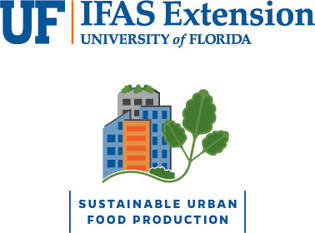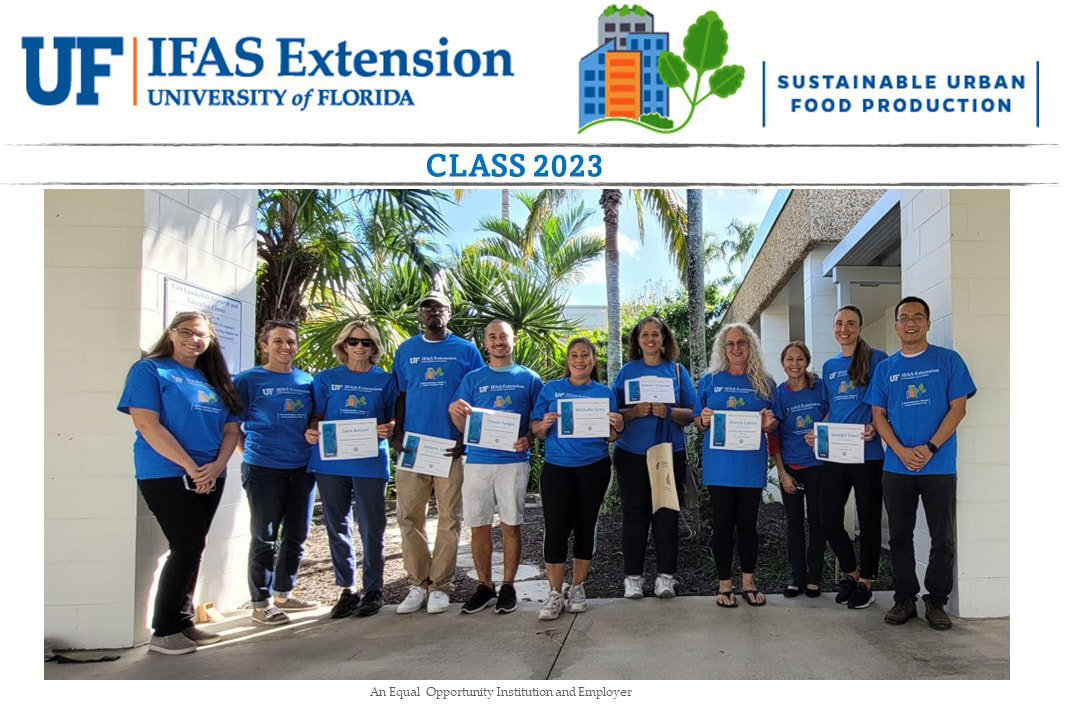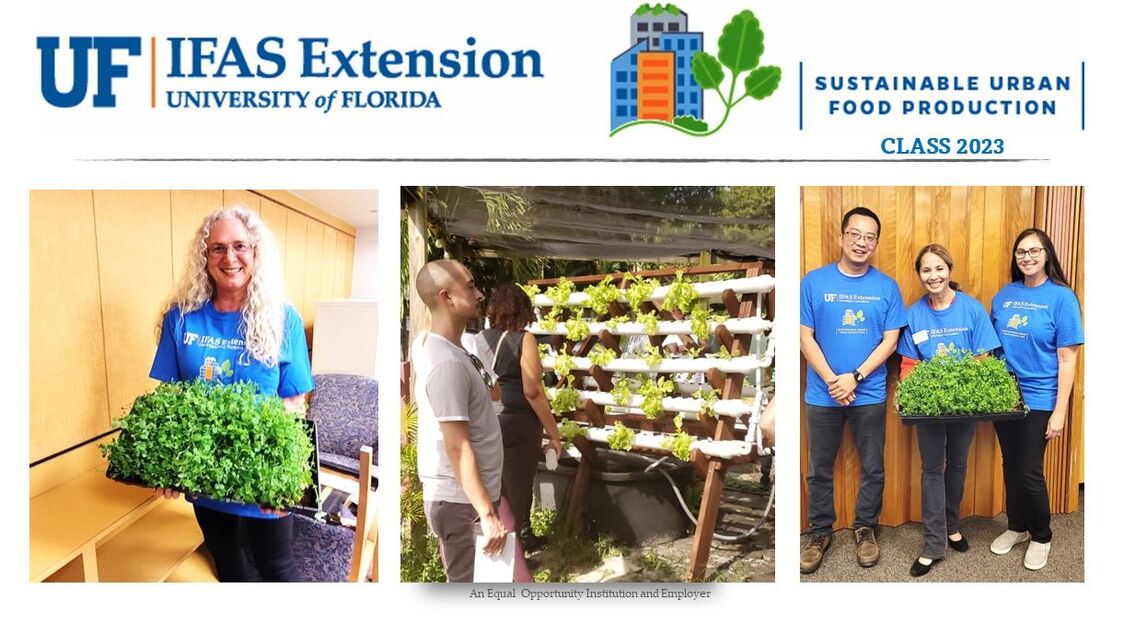EXTENSION PROGRAMS
"Sustainable Urban Agriculture" Extension program
Overview of Extension Program
My extension program conceptually centers on the sustainability of ecosystem services and their resilience to environmental changes in human-dominated landscapes, and practically focuses on urban systems that are at the forefront of regional and global sustainability. Building upon my interdisciplinary research on ecosystem service and landscape sustainability science, my statewide extension program specifically explores the capacities of Urban Agriculture as promising pathways towards fostering urban sustainability and providing resilient urban ecosystem services. Such a program is particularly relevant to diverse stakeholders (see below for each program) in Florida which has been experiencing accelerated urbanization.
Situation statement
Globally, more than half of the population is living in urban areas that rely upon external supplies of resources, such as food, energy, and clean water. It is projected that 2.5 billion more people will live on the planet by the mid-21st century, with disproportionate growth in urban populations and soaring needs for food and other resources. The state of Florida, as the third most populous and one of the fastest-growing states, has increased its population by 11.6% since 2010, reaching to >21 million in 2018. Florida’s population is projected to exceed 31 million in 2050, leading to more intensified urbanization and increasing resource demands. Consequences of urbanization and resource demands in cities are further exacerbated by shifting land use, and increasing impacts of climate change and economic fluctuations. It is thus vital to explore sustainability pathways that enhance resource efficiency in urban systems, reduce tradeoffs, and improve urban resilience.
Urban agriculture has been proposed as a viable sustainability solution that can enhance urban ecosystem services and foster urban resilience to environmental changes. At local scales, as a low-input system, urban agriculture could help to achieve services such as food security, water and energy saving, ecosystem health, and other social-economic benefits (e.g., addressing public health and social inequality). At regional scales, urban agriculture could counteract indirect land-use changes through reducing environmental impacts associated with food transportations.
Due to increasing urbanization and land conversions in Florida, there is a growing interest in prompting urban agriculture to address social and environmental issues. Incipient grass-root and business interests have advocated different forms of urban agriculture (e.g., community garden, peri-urban and vertical farm) across Florida. For example, in south Florida, food security is becoming a major concern, and a recent analysis identified >300 “food deserts” in Broward, Miami-Dade, and West Palm Beach tri-counties where residents have difficulty in accessing affordable, fresh, and nutritious food. The Miami Herald published a series of articles since 2010 on the evolution of urban agriculture sites across south Florida and their potential benefits to local residents. More recently, the Florida legislature passed a bill in 2019 to permit vegetable production in front yards of residential properties, which may serve as a springboard to stimulate future growth of urban agriculture practices in this region.
Despite growing interests, urban agriculture development is still fragmented with limited scales, constraining its impacts on improving urban ecosystem services. Hence, there is an urgent need to scale up urban agriculture adoptions, which can be either achieved (1) at the individual level, through extension teaching about benefits of urban agriculture on ecosystem services and increasing the knowledge base on sustainable practices to empower individual adoptions; and (2) at the policy and regulatory sphere, by teaching urban planners and policymakers about regional implications of urban agriculture for ecosystem service, community livelihoods and resilience, and urban sustainability, which, in the long-term, could enhance policies to support systematic adoptions. Based on needs assessments, I have developed two new statewide extension programs that specifically target these two levels of audiences through bottom-up and top-down processes to increase awareness, facilitate adoptions, and improve management practices of sustainable urban agriculture. These two programs, through a unique lens of sustainability, resilience, and ecosystem service, have filled the extension gaps and fulfilled the highly sought extension needs in the most urbanized regions in Florida.
Through different educational methods and activities (e.g., short-course, workshop, In-service training, field tours, publication, science communication), my short-term extension goal is to increase awareness of social-environmental and resilience benefits of urban agriculture and foster individual adoptions and sustainable practices. My long-term goal is to enhance policy support and promote large-scale adoptions of urban agriculture.
My extension program conceptually centers on the sustainability of ecosystem services and their resilience to environmental changes in human-dominated landscapes, and practically focuses on urban systems that are at the forefront of regional and global sustainability. Building upon my interdisciplinary research on ecosystem service and landscape sustainability science, my statewide extension program specifically explores the capacities of Urban Agriculture as promising pathways towards fostering urban sustainability and providing resilient urban ecosystem services. Such a program is particularly relevant to diverse stakeholders (see below for each program) in Florida which has been experiencing accelerated urbanization.
Situation statement
Globally, more than half of the population is living in urban areas that rely upon external supplies of resources, such as food, energy, and clean water. It is projected that 2.5 billion more people will live on the planet by the mid-21st century, with disproportionate growth in urban populations and soaring needs for food and other resources. The state of Florida, as the third most populous and one of the fastest-growing states, has increased its population by 11.6% since 2010, reaching to >21 million in 2018. Florida’s population is projected to exceed 31 million in 2050, leading to more intensified urbanization and increasing resource demands. Consequences of urbanization and resource demands in cities are further exacerbated by shifting land use, and increasing impacts of climate change and economic fluctuations. It is thus vital to explore sustainability pathways that enhance resource efficiency in urban systems, reduce tradeoffs, and improve urban resilience.
Urban agriculture has been proposed as a viable sustainability solution that can enhance urban ecosystem services and foster urban resilience to environmental changes. At local scales, as a low-input system, urban agriculture could help to achieve services such as food security, water and energy saving, ecosystem health, and other social-economic benefits (e.g., addressing public health and social inequality). At regional scales, urban agriculture could counteract indirect land-use changes through reducing environmental impacts associated with food transportations.
Due to increasing urbanization and land conversions in Florida, there is a growing interest in prompting urban agriculture to address social and environmental issues. Incipient grass-root and business interests have advocated different forms of urban agriculture (e.g., community garden, peri-urban and vertical farm) across Florida. For example, in south Florida, food security is becoming a major concern, and a recent analysis identified >300 “food deserts” in Broward, Miami-Dade, and West Palm Beach tri-counties where residents have difficulty in accessing affordable, fresh, and nutritious food. The Miami Herald published a series of articles since 2010 on the evolution of urban agriculture sites across south Florida and their potential benefits to local residents. More recently, the Florida legislature passed a bill in 2019 to permit vegetable production in front yards of residential properties, which may serve as a springboard to stimulate future growth of urban agriculture practices in this region.
Despite growing interests, urban agriculture development is still fragmented with limited scales, constraining its impacts on improving urban ecosystem services. Hence, there is an urgent need to scale up urban agriculture adoptions, which can be either achieved (1) at the individual level, through extension teaching about benefits of urban agriculture on ecosystem services and increasing the knowledge base on sustainable practices to empower individual adoptions; and (2) at the policy and regulatory sphere, by teaching urban planners and policymakers about regional implications of urban agriculture for ecosystem service, community livelihoods and resilience, and urban sustainability, which, in the long-term, could enhance policies to support systematic adoptions. Based on needs assessments, I have developed two new statewide extension programs that specifically target these two levels of audiences through bottom-up and top-down processes to increase awareness, facilitate adoptions, and improve management practices of sustainable urban agriculture. These two programs, through a unique lens of sustainability, resilience, and ecosystem service, have filled the extension gaps and fulfilled the highly sought extension needs in the most urbanized regions in Florida.
- Program 1: Empowering individual practices of sustainable urban agriculture (i.e., bottom-up process)
- Program 2: Enhancing policies to support and promote large-scale adoptions of sustainable urban agriculture (i.e., top-down process)
Through different educational methods and activities (e.g., short-course, workshop, In-service training, field tours, publication, science communication), my short-term extension goal is to increase awareness of social-environmental and resilience benefits of urban agriculture and foster individual adoptions and sustainable practices. My long-term goal is to enhance policy support and promote large-scale adoptions of urban agriculture.
Sample Extension Publication
The Extension Digital Information System (EDIS) is the electronic repository of all UF/IFAS peer-reviewed extension related publications. This comprehensive system is publicly available with documents that can be readily retrieved.
- Qiu, J., Zhao, H. 2023. Understanding Ecosystem Services from Urban Agriculture. UF/IFAS EDIS FOR (Accepted).
- Qiu, J., Zhao, H, Bravo, L., Ryals, J. 2023. Urban Agriculture and its Sustainability Implications on the Food-Water-Energy Nexus. UF/IFAS EDIS FOR (Accepted).
- Qiu, J., Zhao, H. 2023. Scenario planning in management ecosystem services and natural resources. UF/IFAS EDIS FOR (Accepted).
- Qiu, J., Bayabil, H.K., Li, Y. 2020. Indoor vertical farming systems for food security and resource sustainability. UF/IFAS EDIS FOR360. Available at: https://edis.ifas.ufl.edu/fr429.
- Her, Y., Smyth, A., Qiu, J., Bassil, E., Stingl, U., Reynolds, L. 2020. Online sources for sea level rise education and extension. UF/IFAS EDIS AE543. Available at: https://edis.ifas.ufl.edu/ae543.
- Her, Y., Smyth, A., Fletcher, P., Bassil, E., Stingl, U., Brym, Z., Qiu, J. 2018. Hurricane impacts on Florida’s agriculture and natural resources. EDIS AE528. Available at: https://edis.ifas.ufl.edu/ae528.
Map of Food Deserts and Urban Agriculture Sites in South Florida
Food deserts are defined as census tracts which are low income and have low food access. The two categories are census tracts which are 1 mile from food in an urban area or 10 miles in a rural area, and those which are 0.5 miles from food in an urban area or 10 miles in a rural area.





